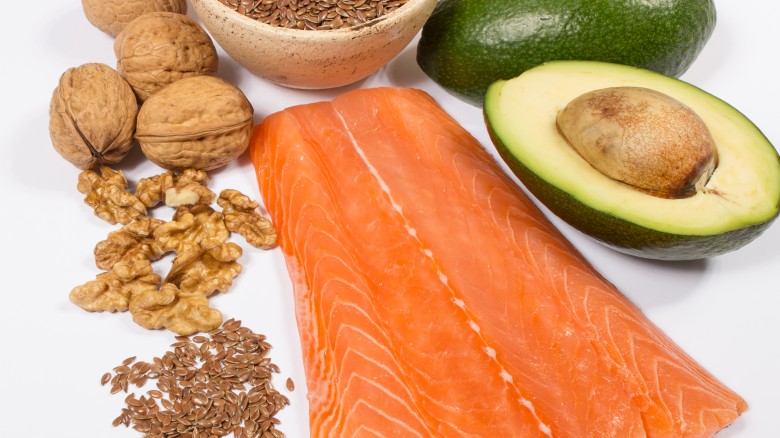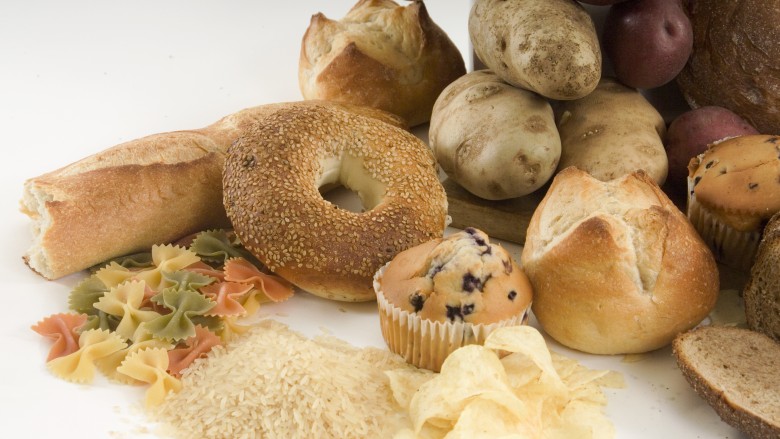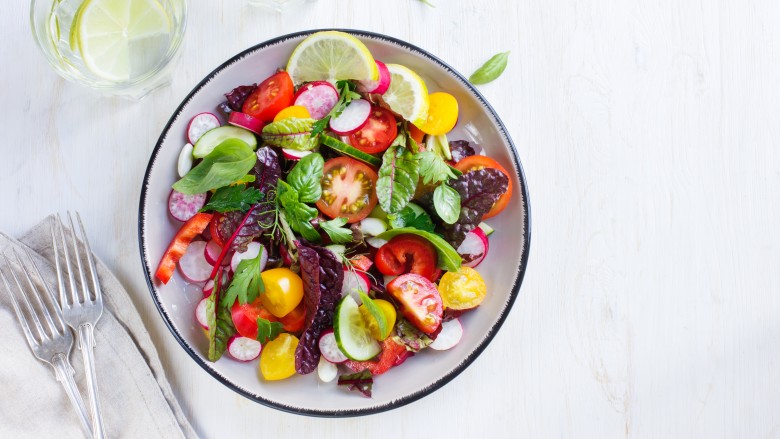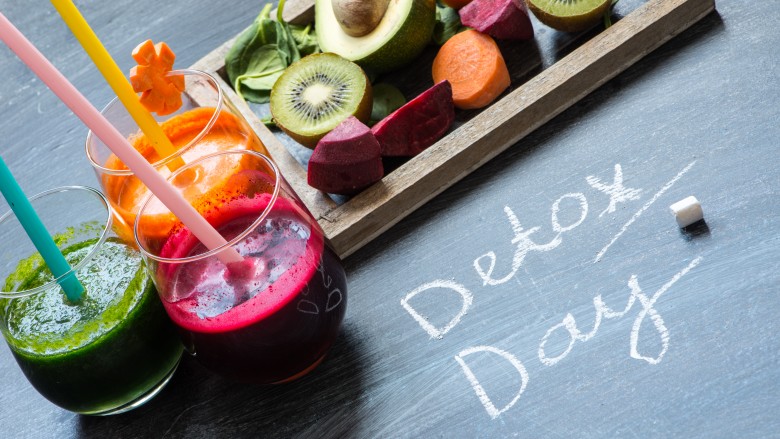False Facts About Burning Fat You Always Thought Were True
It seems like every time you turn around these days, there is another advertisement for a miracle pill or device to help you burn fat. Each of them, of course, claims to be the only one that works! But it isn't just corporations that make this claim. Everyone wants to tell you about their new way of eating, their latest "elimination diet", and the brand new workout they're doing to burn fat. The problem is, most of those "facts" out there, are actually false.
I spoke to some top dietitians and trainers, to find out the most common myths about burning fat that they hear from clients — and gave them the opportunity to (finally!) set the record straight. These are the false facts about burning fat you always thought were true.
Stop eating fat
Kelly Puryear, a registered dietitian nutritionist and the owner of Fuel for the Soul told me that one of the biggest false facts she hears is that eating a low-fat diet helps you burn fat and lose weight. "A diet low in fat is often higher in [sugar] and sugars increase insulin, which is a hormone that promotes the storage of fat," she said. "Eating a high-fat diet, on the other hand, has little-to-no effect on insulin and thus promotes the burning of fat for energy. In short, eating healthy fat burns body fat!"
Luke Hughes, personal trainer and managing director at Origym, agrees. He told me that foods with high fat percentages are just what the body needs as an energy source. "[They] keep you fuller for longer as well as other benefits such as reduced inflammation and increased cognitive ability," he said. "Everything is proportional to your daily consumption and fats have their place, they just need to be unsaturated and be on the low percentage scale." Bring on the avocados, fatty fish, and chia seeds!
Cut the carbs
Similar to the myth that eating low-fat will lead to fat burning, many people believe that cutting out carbs will put them on the right path. Registered dietitian Andy De Santis told me that the most common fat burning misconception he encounters in his private practice is that cutting carbs equals cutting fat. "This misconception usually starts with people fearing starchy carbohydrates like rice, bread, and potatoes — and often extends into a fear of fruit, due to the 'sugar' content which they fear will contribute to fat gain," he said. "This is simply not true."
De Santis told me that a diet rich in whole grains like brown rice, oatmeal, and whole grain bread as well as fruits and vegetables, including potatoes and sweet potatoes, is an incredibly important part of a healthy diet. "Even more importantly" he said, "These foods are very high in dietary fiber and will help keep you not only nourished, but also satiated and satisfied."
You can spot reduce
Personal trainer, coach, and champion powerlifter Robert Herbst told me that perhaps the greatest myth about fat burning, which is perpetuated by infomercials, is that people can spot reduce — or, for example, just lose fat around the waist or upper arms. "[The] only way to lose fat in an area is to lose overall body fat," Herbst told me. "If they do a lot of ab or arm work as part of an overall program and diet, their abs or arms will be stronger and will look great, when they finally lose the fat."
FitFusion trainer Mike Donavanik also pinpointed this one as a particularly egregious myth. "Our genetics determine where we store fat and where we take it off from first, so unfortunately, there's nothing we can do about that either," he said. "That said, you can do ab exercises everyday for an hour a day, but unless you lose the layer of fat that is covering your abs, you won't be able to see them." Donavanik went on to add that we actually tend to lose fat first in the most recent place it was put on.
Certain foods can burn fat
While some people believe certain foods cause you to gain fat, there is also a belief that certain foods can burn fat. Registered dietitian Kaleigh McMordie told me this is a myth. "No certain food you eat will burn fat," she said. "Certain foods are definitely more healthful than others, but there are no miracle foods out there (coconut oil, apple cider vinegar, etc.) that burn fat. A balanced diet full of fruits, vegetables, whole grains, and lean protein — along with exercise — promotes weight loss."
Eating healthy food makes you lose weight
Healthy does not necessarily equal low calorie, and vice versa. Have you ever put a focus on eating super healthy food only to find that you've gained weight and body fat?
Trainer Dani Singer gave me an explanation for this. "Maintaining a caloric deficit (burning more calories than you consume) is the only way to lose weight, excluding surgery," he said. "Many healthy foods aid weight loss because they are satiating without extra calories. That said, it's possible to gain weight while eating healthy food, and lose weight while eating unhealthy food. The determining factor isn't 'healthy-ness', it's calories." There you go.
You should stay in the "fat burning zone"
If you've ever used a heart rate monitor, you may have noticed that the so-called "fat burning zone" is at the lower end of the intensity spectrum. This leads some people to believe that to most effectively burn fat, they should keep their workouts low intensity.
Personal trainer Brent Carter told me that while lower intensity work does in fact utilize (by percentage) more fat than other sources, low intensity also means fewer calories burned overall — compared to something like High Intensity Interval Training (HIIT). At the end of the day, the amount of total calories burned matters as much, or more, than what percentage of those calories come from where. "If you wanted to burn by percentage the most amount of calories from fat, then your strategy should be to sleep all day," he said. "I think we all understand that this would not be effective."
Trainer Luke Hughes agreed, adding that when you do high intensity exercise, "You will also have increased metabolic and sustainable benefits post exercise, resulting in you burning more fat in the long run." Carter called this an oxygen debt that must be paid back in the form of elevated metabolism after exercise is concluded. This means that when you do high intensity work, you continue to burn calories throughout the day. Score!
Amp up the cardio
Celebrity trainer Adam Rosante said that many people believe a long run burns the most fat. "The fact is, strength training is the king of long term fat loss," he said. "Muscle is metabolically active, which means, your body requires more energy to maintain lean muscle mass. So, the more of it you have, the more fat your body will burn while at rest."
He added, however, that people shouldn't just assume that means walking is worthless. "All physical movement expends energy. Remember, expend more energy than you consume and you'll elicit fat loss," he explained. "If you're trying to lose weight, commit to a daily goal of 10,000-12,000 steps."
Muscle can turn into fat
This busted myth comes to me courtesy of British fitness trainer Julia Buckley, who explained, "When you go a while without working out, you start to lose muscle mass (your muscles 'shrink'), but they don't turn into fat," she said. "Fat might end up replacing that muscle mass over time, but muscle and fat are two completely different tissues in your body. You can burn fat and you can lose muscle, but muscle doesn't turn into fat, and fat doesn't magically transform into muscle."
You should do a juice detox
Dr. Caroline Apovian, director of the Nutrition and Weight Management Center at the Boston Medical Center, has heard this false fact several times. This is unsurprising, given how trendy juice detoxes are right now, claiming all sorts of health benefits — in addition to fat burning. "Detoxification is a function of your liver and kidneys," Dr. Apovian said. "Drinking lots of juice does not assist with removing toxins from the body."
She added that many juices are high in sugar and lack fiber, which can result in a blood sugar spike, quickly followed by a crash and accompanying hunger pangs. "While you may lose weight this way, you will also be slowing down your metabolism, due to a lack of protein," she said. "When you begin eating normally again, the weight will come right back on, and you'll have a slower metabolism to boot. Furthermore, being on a juice fast for an extended period of time may result in malnourishment."
The real facts
Let's face it, if you were to follow all of the "facts" out there about burning fat, you'd probably end up hungry, angry, tired — and still not successfully burning more fat than other people. While it may not sound glamorous, the tried and true method of balancing strength training with cardio conditioning for exercise most days of the week, along with a healthy diet with balanced macronutrients (protein, carbohydrates, and fat), is really the only way to go.
It isn't an easy or quick fix, but the experts agree: don't fall for the miracle supplement you see on TV that burns fat with a single pill, or the device to "trim and tone your tummy." Put in the time and effort, and you won't be able to stop checking out at that gorgeous reflection in the mirror!










